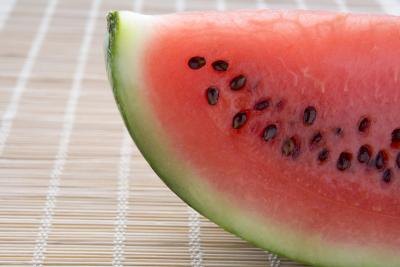Watermelon Nutritional Facts

Watermelon represents a healthy and delicious treat, enjoyed by both kids and adults alike. The melon, a relative of other fruits such as cantaloupe or honeydew, contains a sweet pink or yellow flesh, surrounded by layers of white and green rind. Watermelon can be enjoyed on its own, as an addition to fruit salad -- or even cooked and grilled as a watermelon steak. In addition to its pleasant taste, watermelon contains a number of essential nutrients to benefit your health.
Calories and Energy
Watermelon provides a moderate amount of energy. A 100 g serving of the fruit contains approximately 30 calories, while one cup of diced watermelon contains 46 calories. Water makes up the bulk of watermelon flesh, accounting for over 90 percent of the weight of the fruit, which explains the melon's relatively low calorie content. As a result, watermelon provides an ideal desert for dieters or those looking to lose weight.
Carbohydrate Content
The majority of the calories from watermelon come from its sugar content. Watermelon contains approximately 7.5 g of carbohydrates per 100 g of fruit. Fructose -- a natural fruit sugar, makes up the majority of the sugar content of watermelon, providing the fruit with a sweet taste. In addition, watermelon contains a modest amount of dietary fiber, indigestible carbohydrate matter that promotes the movement of stool through your digestive system. Each 100 g serving of the fruit provides 0.4 g of fiber.
Vitamins and Minerals Content
Watermelon also contains a number of essential vitamins and minerals. In particular, watermelon provides a rich source of vitamins A and C, as well as the essential mineral potassium. Vitamin A helps to promote proper vision, and both vitamins A and C contribute to healthy skin and hair. Potassium helps to regulate your blood pressure, possibly helping to prevent hypertension, a risk factor for heart disease. Consuming watermelon, along with other nutritious foods, helps provide your body with the minerals and vitamins needed to sustain your health.
Other Nutrients
Another beneficial nutrient in watermelon is lycopene, the compound that provides watermelon flesh with its reddish-pink hue. Lycopene acts as an antioxidant in your body, and consuming lycopene may have a number of health benefits. A diet rich in lycopene may lower your risk of developing heart disease, as well as prostate, skin, cervical, lung and bladder cancer, according to Florida State University. Watermelon provides one of the richest dietary sources of lycopene, so consume the fruit regularly to help maintain your health.

Watermelon represents a healthy and delicious treat, enjoyed by both kids and adults alike. The melon, a relative of other fruits such as cantaloupe or honeydew, contains a sweet pink or yellow flesh, surrounded by layers of white and green rind. Watermelon can be enjoyed on its own, as an addition to fruit salad -- or even cooked and grilled as a watermelon steak. In addition to its pleasant taste, watermelon contains a number of essential nutrients to benefit your health.
Calories and Energy
Watermelon provides a moderate amount of energy. A 100 g serving of the fruit contains approximately 30 calories, while one cup of diced watermelon contains 46 calories. Water makes up the bulk of watermelon flesh, accounting for over 90 percent of the weight of the fruit, which explains the melon's relatively low calorie content. As a result, watermelon provides an ideal desert for dieters or those looking to lose weight.
Carbohydrate Content
The majority of the calories from watermelon come from its sugar content. Watermelon contains approximately 7.5 g of carbohydrates per 100 g of fruit. Fructose -- a natural fruit sugar, makes up the majority of the sugar content of watermelon, providing the fruit with a sweet taste. In addition, watermelon contains a modest amount of dietary fiber, indigestible carbohydrate matter that promotes the movement of stool through your digestive system. Each 100 g serving of the fruit provides 0.4 g of fiber.
You Might Also Like
Vitamins and Minerals Content
Watermelon also contains a number of essential vitamins and minerals. In particular, watermelon provides a rich source of vitamins A and C, as well as the essential mineral potassium. Vitamin A helps to promote proper vision, and both vitamins A and C contribute to healthy skin and hair. Potassium helps to regulate your blood pressure, possibly helping to prevent hypertension, a risk factor for heart disease. Consuming watermelon, along with other nutritious foods, helps provide your body with the minerals and vitamins needed to sustain your health.
-
Other Nutrients
Another beneficial nutrient in watermelon is lycopene, the compound that provides watermelon flesh with its reddish-pink hue. Lycopene acts as an antioxidant in your body, and consuming lycopene may have a number of health benefits. A diet rich in lycopene may lower your risk of developing heart disease, as well as prostate, skin, cervical, lung and bladder cancer, according to Florida State University. Watermelon provides one of the richest dietary sources of lycopene, so consume the fruit regularly to help maintain your health.





